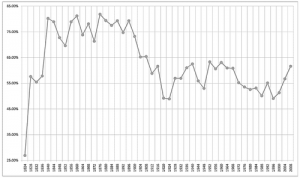Our thirty-third president, Franklin Delano Roosevelt once said, “Nobody will ever deprive the American people of the right to vote except the American people themselves and the only way they could do this is by not voting.”
Each year, those words become truer.
Recently, the City of Raleigh held its biennial city council election and of the 276,500 registered voters in Raleigh, only 13% went to the polls, meaning that roughly 35,000 people decided the leadership of nearly 440,000 people.
In 2014, every single U.S. House seat was up for election, along with one-third of the Senate seats. Only 36.4% of eligible voters showed up nationwide. North Carolina itself had a turnout of only 40% of the eligible populace.
Until 1896, voter turnout in the U.S. was somewhere between 75%-80%. Then, at the turn of the century, turnout took a sharp dive, dipping to the fifty and sixty percent.
Ever since, the voter turnout rate for national elections has never surpassed 70%. This issue is due in part to political apathy that has spread at an epidemic pace throughout the U.S.
The United States isn’t alone. Canada seems to have a similar problem, with its voter turnout barely breaking 60% in their most recent election in 2011. Turnout is a little better in the United Kingdom, in which 66% of voters showed up to general elections in 2015. Across the Channel, however, voting rates are comparatively stunning. In France, 80% of the electorate showed up for the 2012 presidential election, and in Belgium, 90% of the voting populace put their replies in the ballot box for the 2014 parliamentary elections. In the Netherlands, the rate was 75%. On the other side of the world, Australia’s turnout was 93%.
So what is so different about the United States, the United Kingdom, and Canada?
For one, in Belgium and Australia, voting is compulsory. In Australia, enforcement of compulsory voting is more stringent, as citizens over the age of eighteen may be fined $20 for not showing up to vote.
According to the BBC, French polling numbers are so high because the voters of France are tired of the old, and want to bring in the new, younger politicians. Also, the most recent presidential vote in France was held on Sunday rather than a workday. Helen Drake, a lecturer at Loughborough University in the United Kingdom, told the BBC that “In some ways French politics is anchored to the past and the notion that French politics is exceptional, and that exceptionalism is linked to the French Revolution of the late 1700s – that dramatic transformation in the French system from monarchy to republic.” and that “the idea of a French republic as a form of government is in [the French people’s] DNA.”
In the Netherlands, political participation stems from the presence of so many political parties with power in the Dutch provincial parliaments. Specific parties, such as 50Plus (which focuses on pensioner issues) and the Party for the Animals (which, as the name suggests, focuses on animal rights) currently hold thirty-two seats in provincial parliaments. This party specialization convinces passionate citizens to actually care about elections, unlike in the U.S., where a two-party system has presented somewhat of a “lesser-of-two-evils” situation.
However, a dangerous thing is happening in the U.S. that could bog our political system down even more: an incoming generation of apathetic voters, aka, our current teenagers.
According to a poll administered by the BBC, less than a third (31%) of British teens were interested in politics. However, the same poll revealed that more than two-thirds of British adults of all ages thought that they would be seriously neglecting their duty to their country if they didn’t vote. Of the 16 and 24 year olds questioned for the poll, more than 40% stated that they had absolutely no interest in politics.
This problem could stem from many issues. One such issue could be that American teens are presented with things arguably more interesting than politics. (In the past week, which have you checked more: political updates or your Twitter/Instagram/etc.). In a generation so saturated with distractions, it’s no wonder that politics aren’t placed as a priority.
Another reason for this apathy could be the overall disillusionment with the political system. In an era with high incumbency rates, far-reaching government programs and the existence of a system that has seemingly screwed up the world for the next generation, teenagers may feel that we have reached a point of no return and that nobody in politics cares about them.
However, this turning off of an entire population to politics can be prevented. High schoolers can be encouraged by their parents to get involved in politics to prevent a bleak future and teachers could encourage of-age students to register and participate in the voting process. Hopefully, with such actions, the political future of our generation may not be so eroded.

Leave a Reply